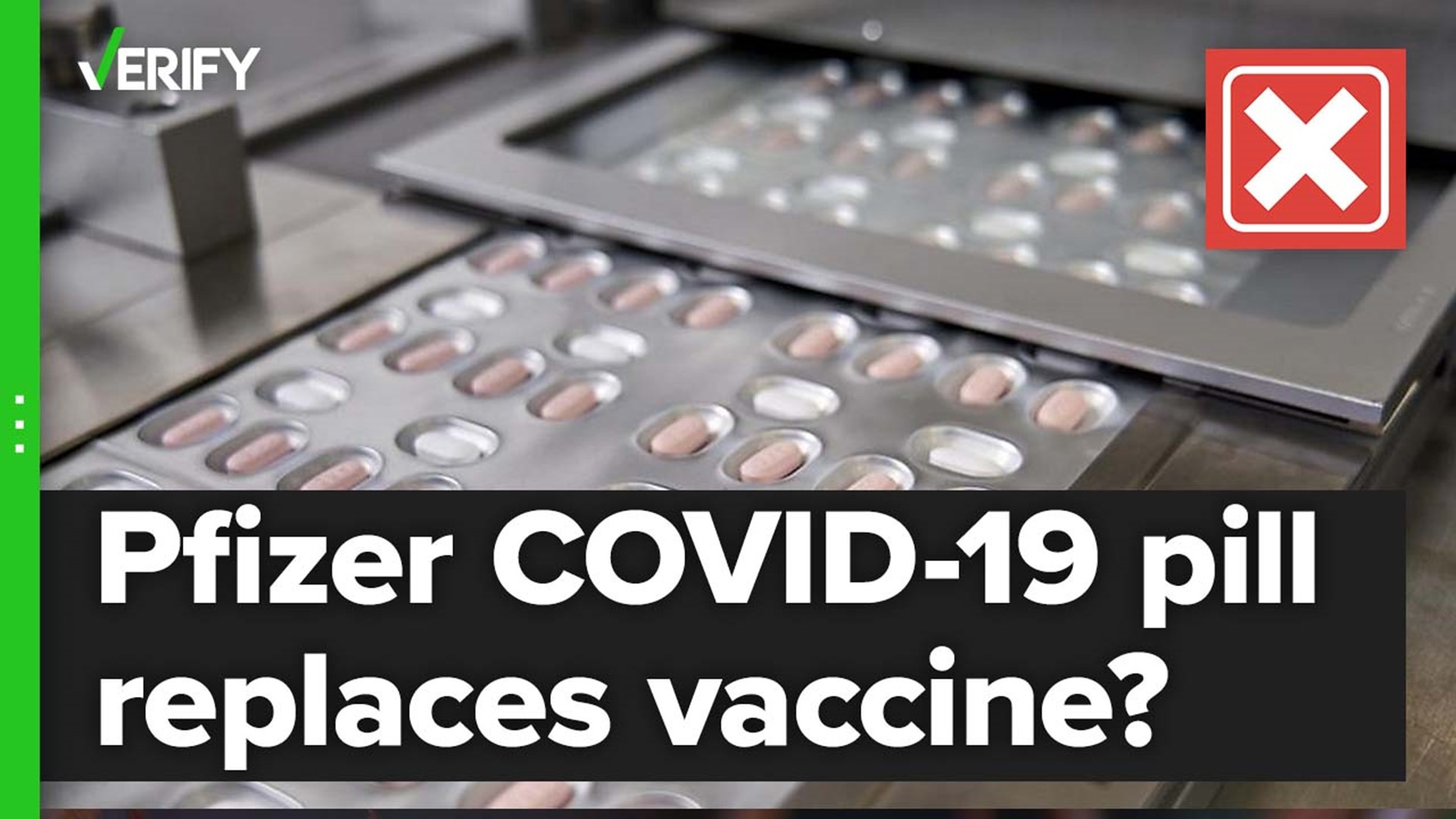UPDATE: The U.S. Food and Drug Administration (FDA) issued an emergency use authorization for Pfizer's COVID-19 pill treatment on Dec. 22, 2021.
Pfizer’s Paxlovid is for the treatment of mild-to-moderate COVID-19 in adults and pediatric patients over the age of 12 with positive results of direct COVID-19 testing, and who are at high risk for progression to severe COVID-19, including hospitalization or death.
“Today’s authorization introduces the first treatment for COVID-19 that is in the form of a pill that is taken orally — a major step forward in the fight against this global pandemic,” said Dr. Patrizia Cavazzoni, director of the FDA’s Center for Drug Evaluation and Research.
Paxlovid is available by prescription only and should be initiated as soon as possible after diagnosis of COVID-19 and within five days of symptom onset, according to the FDA.
-----------------------------------------------------------------------
PREVIOUS REPORTING: Pfizer on Nov. 5 announced that results from a clinical trial found its COVID-19 pill treatment was effective at reducing coronavirus-related hospitalizations and death.
The announcement prompted questions on Twitter (like this one retweeted more than 1,000 times and this one retweeted nearly 200 times) suggesting the pill could replace the COVID-19 vaccine. VERIFY viewer Jason also asked if the pill works within the body the same as Pfizer’s COVID-19 vaccine.
THE QUESTION
Can Pfizer’s COVID-19 pill treatment replace vaccines?
THE SOURCES
- Pfizer
- Dr. Sherrill Brown, medical director of infection prevention at AltaMed Health Services
- Dr. Joanne Lemieux, biochemistry professor at University of Alberta
- Dr. David Frick, biochemistry professor at the University of Wisconsin-Milwaukee
THE ANSWER
No, Pfizer’s COVID-19 pill treatment can’t replace vaccines. The pill treatment is intended to help people who are already infected with COVID-19, not help prevent infection.
WHAT WE FOUND
Dr. Sherrill Brown, medical director of infection prevention at AltaMed Health Services, explained that the COVID-19 vaccines and antiviral pill treatments work differently. The vaccines teach the immune system how to fight off the SARS-CoV-2 virus, which causes COVID-19. That helps prevent infection, which the pill treatment doesn’t do.
“The pill is not a preventative, the pill would be used as a treatment,” Brown said. “So, you actually have to get the infection in order to use the pill.”
Once infected, Pfizer says its pill treatment is effective at keeping people out of the hospital.
The clinical trial for Pfizer’s pill treatment included 1,219 unvaccinated adults who tested positive for COVID-19 within a five-day period, had mild to moderate symptoms and had an increased risk for severe illness. The company said people who began its pill treatment within three days of showing symptoms had an 89% reduction in risk of COVID-19-related hospitalization or death compared to people who received a placebo.
“This is a good backup,” Brown said of Pfizer’s pill treatment. “But, really, preventing the infection is the best thing.”
That is why doctors and the Centers for Disease Control and Prevention (CDC) say getting vaccinated is the best way to prevent getting COVID-19.
The regimen for Pfizer’s pill treatment is three pills taken twice a day for five days. The treatment is highly dependent on people quickly identifying they are experiencing mild COVID-19 symptoms.
“If you’re sick enough to go to a hospital, it might be too late to take these pills,” said Dr. David Frick, a professor of biochemistry and chemistry at the University of Wisconsin-Milwaukee.
Dr. Joanne Lemieux, a professor at the University of Alberta’s biochemistry department, said Pfizer’s antiviral pill treatment targets an enzyme in the SARS-CoV-2 virus, called a protease, that the coronavirus needs to replicate. The same mechanism has been used to treat other viral infections.
“Other antivirals that target viral proteases have been developed for viruses such as HIV and hepatitis C, and these have been very effective at controlling spread in the community and treating infections,” Lemieux said.
Lemieux noted that the pill treatment could be useful for people with compromised immune systems who don’t have a robust response to the COVID-19 vaccines. Pill treatments could also be especially helpful for people in countries with limited access to COVID-19 vaccines. Pfizer says it is working with a United Nations-backed public health organization to increase access to its antiviral pill treatment to low- and middle-income countries.
Pfizer on Nov. 16 submitted an application to the U.S. Food and Drug Administration (FDA) seeking emergency use authorization of its pill treatment, which will be branded as Paxlovid, for people with mild to moderate COVID-19 who are at an increased risk of hospitalization or death.
The FDA is also weighing the authorization of an antiviral COVID-19 pill treatment developed by Merck, which the company says reduced the risk of hospitalization or death by about 50% for people who began the regimen within five days of showing symptoms.
More from VERIFY: No, Pfizer’s CEO was not arrested by the FBI for fraud

